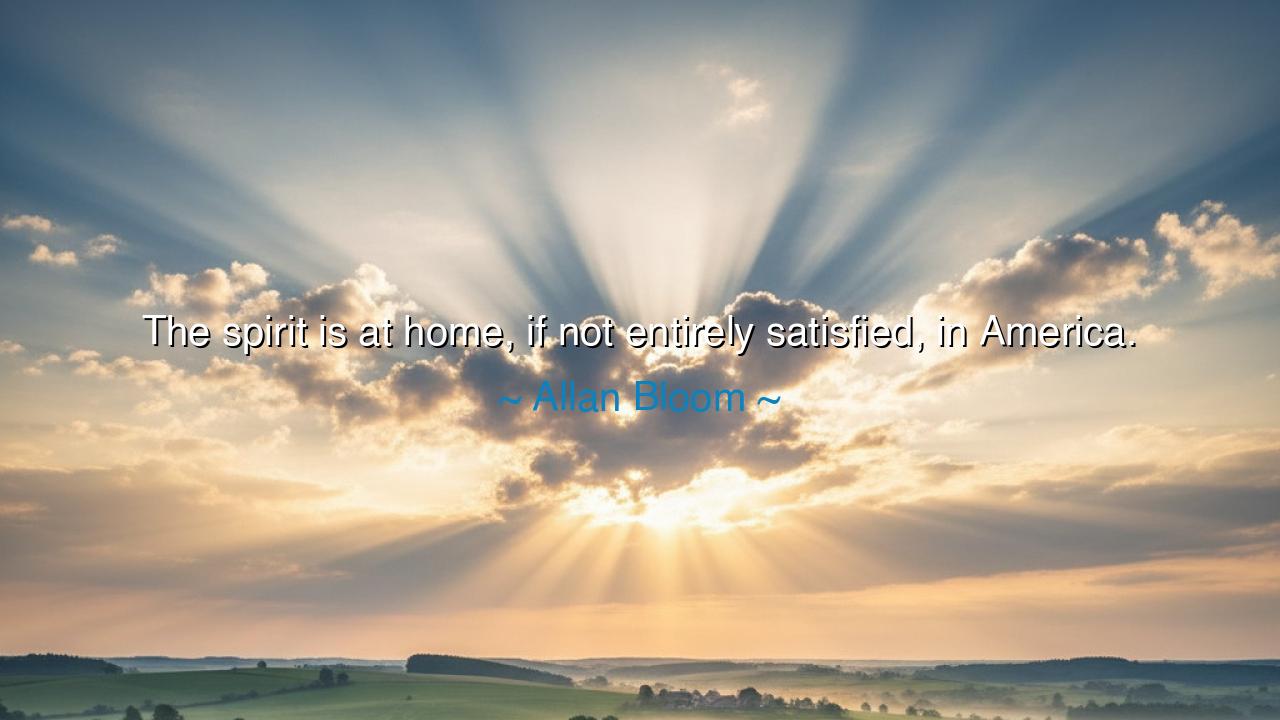
The spirit is at home, if not entirely satisfied, in America.






“The spirit is at home, if not entirely satisfied, in America.” Thus spoke Allan Bloom, the philosopher who gazed into the soul of modern civilization and sought to understand its restless heart. His words, simple yet profound, are not flattery but reflection — an observation of a people who have built a home for the human spirit, yet who still wander within it, hungry for meaning. In this quote, Bloom captures the paradox of the American condition: a nation founded on liberty, overflowing with opportunity, yet forever yearning for something higher, something deeper than material success.
For what is the spirit, if not that divine spark within man that craves truth, beauty, and purpose? And what is America, if not the great experiment — the land where that spirit was given the freedom to roam, to dream, to become? Here, the individual was set free from kings and ancient chains, told that he might shape his own destiny. The spirit found a home in that promise, for it thrives where it may choose, where it may strive, where it may hope. Yet, as Bloom reminds us, it is not entirely satisfied, for freedom alone cannot fill the soul. Liberty feeds the will, but not always the heart.
In ancient times, the philosophers of Greece sought the same balance that America seeks now: how to unite freedom with virtue, individuality with wisdom. Socrates walked the streets of Athens questioning everything, driven by the same restless energy that stirs the American soul. He was at home among free thinkers, yet dissatisfied with their shallow pursuits. So too, Bloom suggests, the modern spirit — especially the American spirit — finds comfort in liberty but still aches for depth, for a moral compass, for the beauty of higher thought. The marketplace of ideas is vast, yet not all who walk it find nourishment.
Bloom wrote these words in an age when America was rich in possessions but poor in reflection. He saw a people surrounded by comfort but haunted by emptiness — citizens who had won the world but risked losing their souls. He called upon the young to seek more than amusement, to rediscover the great questions of philosophy, to pursue wisdom rather than distraction. In his eyes, the American spirit was noble but restless, vibrant but uncertain — like a pilgrim who has built a house, yet still looks to the horizon for a homeland unseen.
Consider the story of Abraham Lincoln, whose life embodies this truth. Born in poverty, self-taught, forged by hardship, he rose to lead a divided nation. In him, the spirit was at home — rooted in freedom, guided by conscience. Yet even Lincoln knew that the promise of America was unfinished. His greatest speeches speak of striving, of perfecting a union that was good but not yet just, noble but not yet whole. He, too, lived with Bloom’s paradox: proud of the home he belonged to, yet ever aware that the spirit must continue to labor for what is true and eternal.
There is both triumph and warning in Bloom’s words. To be at home is a blessing — to dwell in a land that welcomes the dreamer and the thinker. But to be not entirely satisfied is also a gift, for it keeps the fire of growth alive. Satisfaction breeds complacency; restlessness breeds creation. The great poets, inventors, and reformers of America have all felt that tension — the sense that this land of liberty is not an end, but a beginning, a place where the spirit may strive toward perfection but never fully arrive.
Lesson: Embrace both the comfort and the longing. Be grateful for the freedom that lets your spirit breathe, but do not let freedom lull you into ease. Seek knowledge, cultivate virtue, and honor the restless yearning that stirs within you — for it is the sign of life, the echo of eternity. Remember that the spirit is never meant to rest forever, but to rise. And as Allan Bloom teaches, though your soul may find a home in this land, its truest fulfillment lies not in wealth or fame, but in the endless pursuit of truth and meaning.
So, dwell here with gratitude, but walk onward with purpose. Build your home, but let your heart remain awake. For in the tension between contentment and striving, the human spirit finds both its home — and its destiny.






AAdministratorAdministrator
Welcome, honored guests. Please leave a comment, we will respond soon